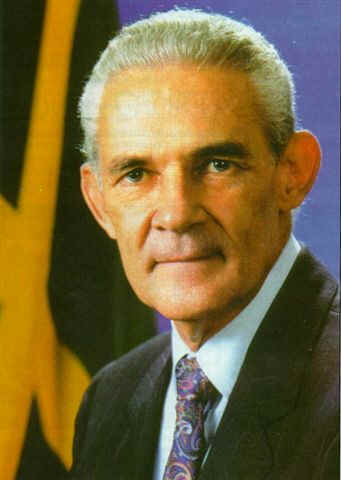Michael Norman Manley, the fourth Prime Minister of Jamaica, born on the 10th of December 1924 in St Andrew and died on the 6th of March 1997 of prostate cancer, son of Norman and Edna Manley. He was one of the most outstanding political figures in the post-colonial history of the Caribbean.
Michael studied at Jamaica College from 1935 to 1943 and overseas at the London School of Economics from 1945 to 1949. He served Jamaica in the capacity of Prime Minister between the periods March 2, 1972 to November 4, 1980; and February 13, 1989 to March 30, 1992.
He is considered one of Jamaica’s best Prime Ministers since independence. With Manley as Prime Minister, Jamaica established a minimum wage for all workers, including domestic workers. In 1974, Manley proposed free education from primary school to university.
The introduction of universally free secondary education was a major step in removing the institutional barriers to private sector and preferred government jobs that required secondary diplomas.
The PNP government in 1974 also formed the Jamaica Movement for the Advancement of Literacy (JAMAL), which administered adult education programs with the goal of involving 100,000 adults a year, which is still active today. The minimum voting age was lowered to 18 years, while equal pay for women was introduced.
Maternity leave was also introduced, while the government outlawed the stigma of illegitimacy. The Masters and Servants Act were abolished, and a Labour Relations and Industrial Disputes Act provided workers and their trade unions with enhanced rights.
The National Housing Trust was established, providing “the means for most employed people to own their own homes,” and greatly stimulated housing construction, with more than 40,000 houses were built between 1974 and 1980.

The PNP lost the 1980 election to the conservative Jamaica Labour Party (JLP) of Edward Seaga. During his period of opposition in the 1980s, Manley, a compelling speaker, travelled extensively, speaking to audiences around the world. He taught a graduate seminar and gave a series of public lectures at Columbia University in New York.
After nine years in opposition, Manley returned to power in 1989, in his third term as Prime Minister, Manley followed many of Seaga’s policies, although he tended to put greater emphasis on small-scale businesses and increased spending on education.
Also, like Seaga, he forged a close relationship with the United States, even supporting President George Bush’s proposed North American Free Trade Agreement to reduce tariffs between the United States, Mexico, and Canada.
Manley retired from the premiership on grounds of ill-health in 1992, handing over power to P. J. Patterson. He has subsequently worked as a consultant and has contributed to various regional commissions and organizations.
Manley also founded the International Bauxite Association and spearheaded the International Seabed Authority, which both have their headquarters in Kingston, and served as vice-president of the Socialist International for Latin America and the Caribbean in 1978. Michael Manley’s legacy still lives on, when it comes to politics; many are of the view that he was the best they ever had. Michael had five wives, and five children, one by each wife.